Impact of SearchGPT on SEO: What You Need to Know

 15 min
15 min
Not every shift in the digital ecosystem deserves the word “paradigm.” This one does.
SearchGPT isn’t just another machine-learning layer added to search engines. It’s a recalibration of how we find, consume, and act on information. What began as a large language model experiment is now upending the business logic of search itself.
The impact of SearchGPT on SEO is not theoretical. It is measurable, consequential, and accelerating — disrupting the visibility economics that powered digital marketing for two decades. If your business, brand, or livelihood depends on organic discoverability, this is not the wave to watch — it’s the one you need to surf or be swallowed by.
Generative AI has moved from novelty to infrastructure. And with it, the rules of search — long held as gospel — are being rewritten, line by line.
Want to Understand the Impact of SearchGPT on SEO?
Discover how the impact of SearchGPT on SEO is reshaping content strategy, rankings, and user behavior. Fill out the form to get personalized insights tailored to your business goals.
Get My Custom SEO Analysis
What Is SearchGPT and Why Is It Disrupting Search?
Here’s the short version: SearchGPT is not a search engine. It’s an answer engine.
Instead of crawling indexed links and returning a hierarchy of ranked pages, SearchGPT interprets, synthesizes, and delivers direct responses — often more nuanced, contextual, and helpful than anything in the top ten blue links. It doesn’t point to information. It becomes the information.
For the user, it’s frictionless. For the SEO industry? Friction turned existential. The impact of SearchGPT on SEO lies not in competition, but in displacement. We’re watching a functional leap — from referral systems to direct delivery, from ranked listings to personalized synthesis.
This is why the disruption feels different. It doesn’t just shift user behavior — it fundamentally alters the visibility landscape. A page doesn’t need to rank; it needs to train the engine. SEO for SearchGPT is about influence, not just presence.
You can no longer afford to be optimized only for what humans type — you must also be legible to what machines understand.
How SearchGPT Differs from Traditional Search Engines
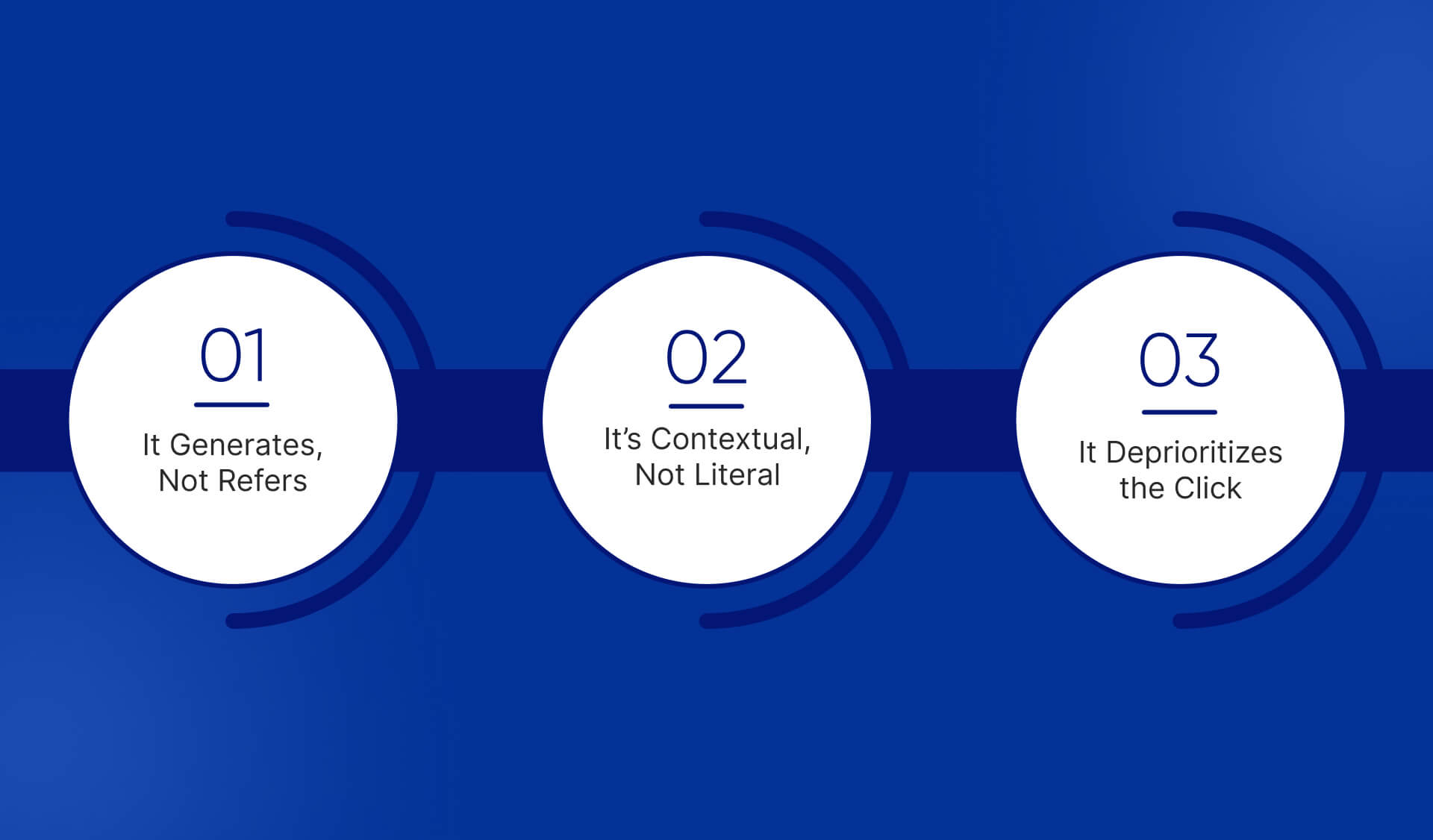
To describe SearchGPT as a “new kind of search” is an understatement. It’s not playing by the same rules — or even on the same field.
Search engines like Google function through indexation, crawling billions of webpages, using algorithmic logic to determine relevance and authority, and presenting users with a ranked list of links. You search, you click, you explore.
SearchGPT collapses that journey. It doesn’t suggest — it answers. Using deep learning models trained on vast datasets, it doesn’t retrieve information, it reconstructs it. And it does so in a conversational, human-like format, anticipating nuance, follow-ups, and context.
Here’s how that diverges from the search engines we’ve come to rely on:
1. It Generates, Not Refers
Search engines are curators. SearchGPT is a composer. It writes new text from its learned understanding. That alone reframes the searchGPT SEO conversation: optimization must now appeal to the algorithm’s synthesis preferences, not just crawlability.
2. It’s Contextual, Not Literal
A traditional search is literal. “Best time to post on Instagram” yields guides, blog posts, stats. Ask SearchGPT the same question, and it contextualizes — time zones, industry, audience type. It layers insight. For SEO, this means optimizing for depth, not just keywords.
3. It Deprioritizes the Click
This is the heart of the matter. SEO once lived and died by the click. With SearchGPT, the user often never leaves the interface. For businesses, this decouples visibility from traffic. The best SearchGPT SEO services now treat presence inside AI outputs as the new form of ranking.
Traditional search rewards presence. SearchGPT rewards relevance. That’s not semantics — it’s a business model shift.
Ready to Optimize SEO for SearchGPT Success?
Explore how SEO for SearchGPT requires smarter strategies, conversational content, and AI visibility. Fill out the form to see what your current content is missing right now.
Unlock My SEO Audit
Key SEO Elements Affected by SearchGPT
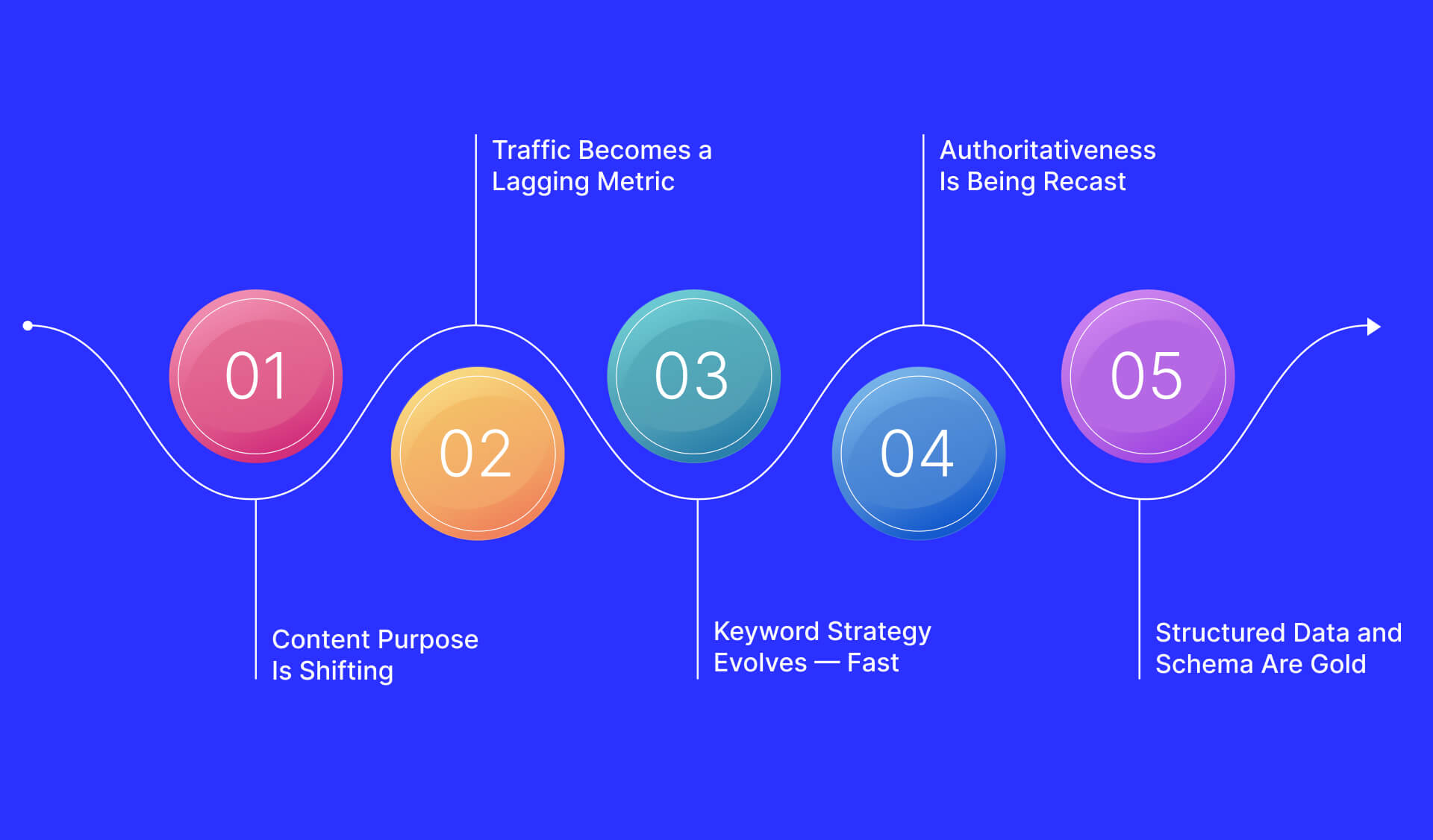
It’s tempting to think of this as just another Google Core Update with fancier syntax. That’s a dangerous underestimation. SearchGPT is not refining SEO signals — it’s reinventing the gameboard.
Here’s what’s already changing for those paying attention:
1. Content Purpose Is Shifting
We’re no longer writing for users only. We’re writing through AI — creating assets that inform, train, and feed large language models. The impact of SearchGPT on SEO is moving us from ranking-focused content to AI-ingestible content.
2. Traffic Becomes a Lagging Metric
Previously, strong SEO meant strong traffic. But now, even if you’re the knowledge source behind a GPT response, you may receive no visit, no attribution, no lead. The rise of AI-generated answers is forcing the top SearchGPT SEO services to rethink how value is measured. Visibility must now factor in influence without interaction.
3. Keyword Strategy Evolves — Fast
Traditional SEO relies heavily on keyword volume, density, and intent mapping. But with conversational AI at the helm, users are asking longer, more natural, highly specific queries. SEO for SearchGPT demands a semantic web approach: entities, relationships, and clear context matter more than exact matches.
4. Authoritativeness Is Being Recast
With AI, trust signals aren’t about backlinks alone. They’re about consistency, clarity, and content integrity. If you’ve been seen as an authority across a topic over time, you’re more likely to inform the machine — and appear in its response. The best SearchGPT SEO services are now auditing topical authority and corpus-wide coherence, not just individual page performance.
5. Structured Data and Schema Are Gold
Machines don’t “read” the way we do. They parse, extract, and model. Schema markup, structured metadata, FAQ blocks — these are no longer technical nice-to-haves. They’re essential conduits between your content and the LLMs shaping how it’s interpreted.
And if that sounds dramatic, it’s because it is. We're witnessing the first true decoupling of content creation from content consumption. For every SEO professional who thought the rules had solidified, consider this your reset button.
Opportunities for SEO in the Age of AI Search
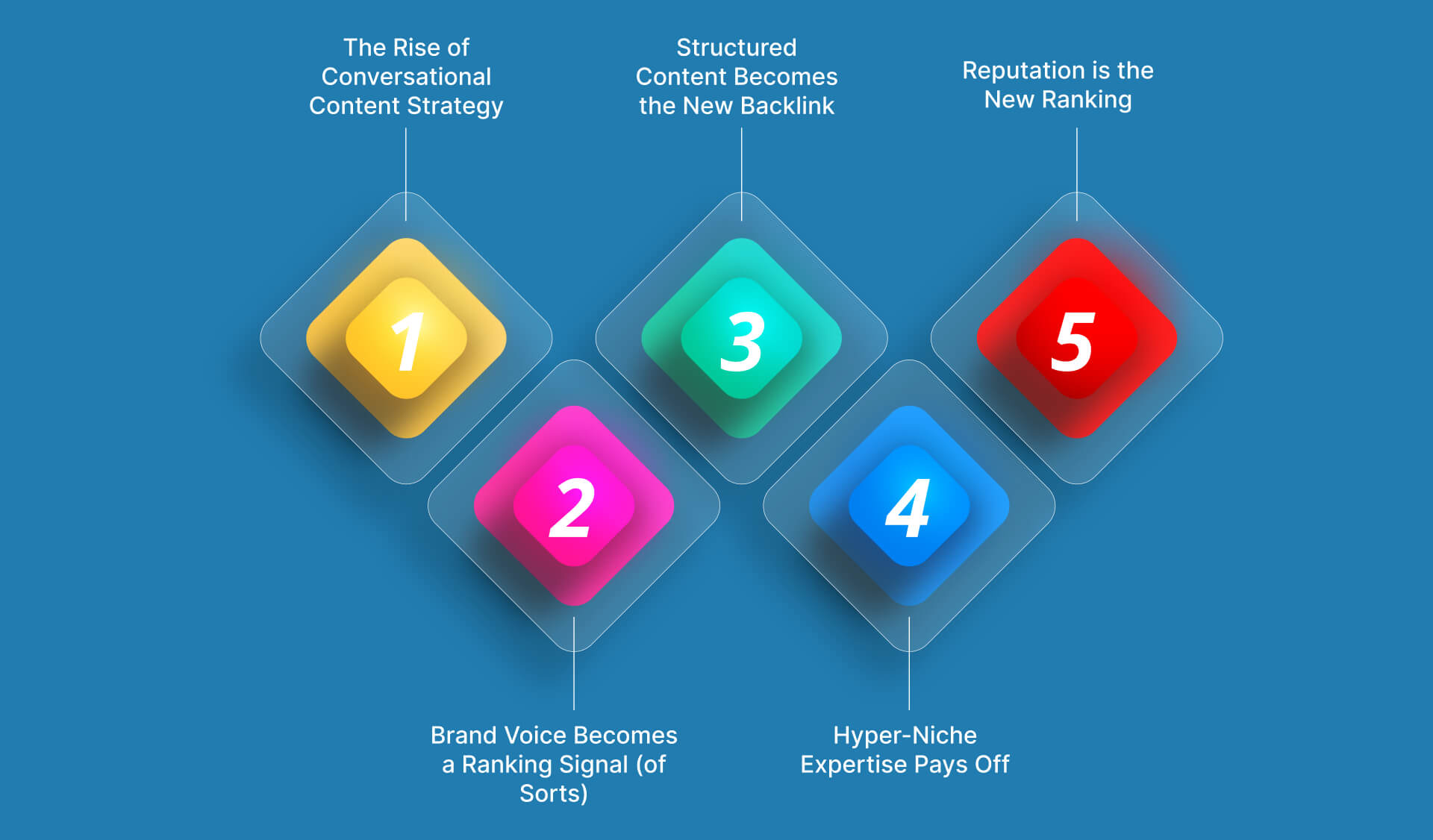
Let’s get one thing straight — this isn’t the death of SEO. It’s the rebirth.
The rise of generative AI search, and more specifically, SearchGPT, is forcing an overdue evolution. And while much of the industry is fretting about disappearing traffic and attribution black holes, those who are really paying attention see something different: an opening. A wide one.
The impact of SearchGPT on SEO is profound, yes — but it’s also full of possibility.
1. The Rise of Conversational Content Strategy
SearchGPT thrives on natural language. That means brands now have an opportunity to lean into voice, tone, and conversational clarity like never before. Dry, keyword-stuffed pages are not what get quoted or synthesized by generative models.
Instead, context-rich, user-focused, clearly structured content is what drives inclusion.
This changes how we approach content at its core. You’re no longer writing for an algorithm — you’re writing through it, to a user who expects intelligence, nuance, and value in one coherent sentence.
For agencies offering top SearchGPT SEO services, this is a goldmine. Because most websites aren’t ready. The businesses that get this right will dominate visibility in a world where the AI is doing the reading.
2. Brand Voice Becomes a Ranking Signal (of Sorts)
While SearchGPT doesn’t rank pages traditionally, it does lean toward sources it deems credible and consistent. That’s where brand voice steps in. A consistent tone across a body of content helps establish expertise, coherence, and trust — all attributes the model uses to weigh whether your information is synthesis-worthy.
This is a new frontier in SEO for SearchGPT: editorial integrity meets algorithmic recognition. Content that sounds human, authoritative, and unmistakably yours gets remembered — and reused.
3. Structured Content Becomes the New Backlink
We’ve said it before, but it bears repeating: structure is the new king. Using schema markup, FAQs, summaries, and semantic clarity signals not just what your content says, but how it can be understood.
This isn’t just smart optimization — it’s strategic visibility. The best SearchGPT SEO services are already leaning heavily into structured content frameworks that make it easier for generative models to pull, combine, and credit (even subtly) your material.
Think of your content not just as an asset, but as an API endpoint for AI. The cleaner and clearer it is, the more likely it is to be used.
4. Hyper-Niche Expertise Pays Off
SearchGPT, like any model, depends on training data. That means highly specific, well-written, original content in niche domains becomes disproportionately powerful. Why? Because the model often lacks depth in these areas and looks for clarity and reliability.
This opens up tremendous white-space opportunities. While everyone’s still fighting over general SEO guides, the real wins will come from owning your niche. And that’s where the best searchGPT SEO agency helps.
The brands that invest in rich, authoritative niche content today will be the invisible engines behind tomorrow’s AI answers.
5. Reputation is the New Ranking
In an AI-driven search model, your reputation — not just your rankings — will determine how often your content gets surfaced, referenced, and trusted. This means reviews, expert bios, author authority, and digital trust signals are not peripheral anymore. They are core SEO assets.
In short, we’re heading toward a future where trust earns traffic. And those offering top searchGPT SEO services will be the ones architecting that trust layer.
Need the Best SearchGPT SEO Services for 2025?
If you're serious about visibility, now's the time to act. Get matched with the best SearchGPT SEO services for your industry and future-proof your digital marketing efforts.
Request My SEO Plan
Challenges SEO Professionals May Face
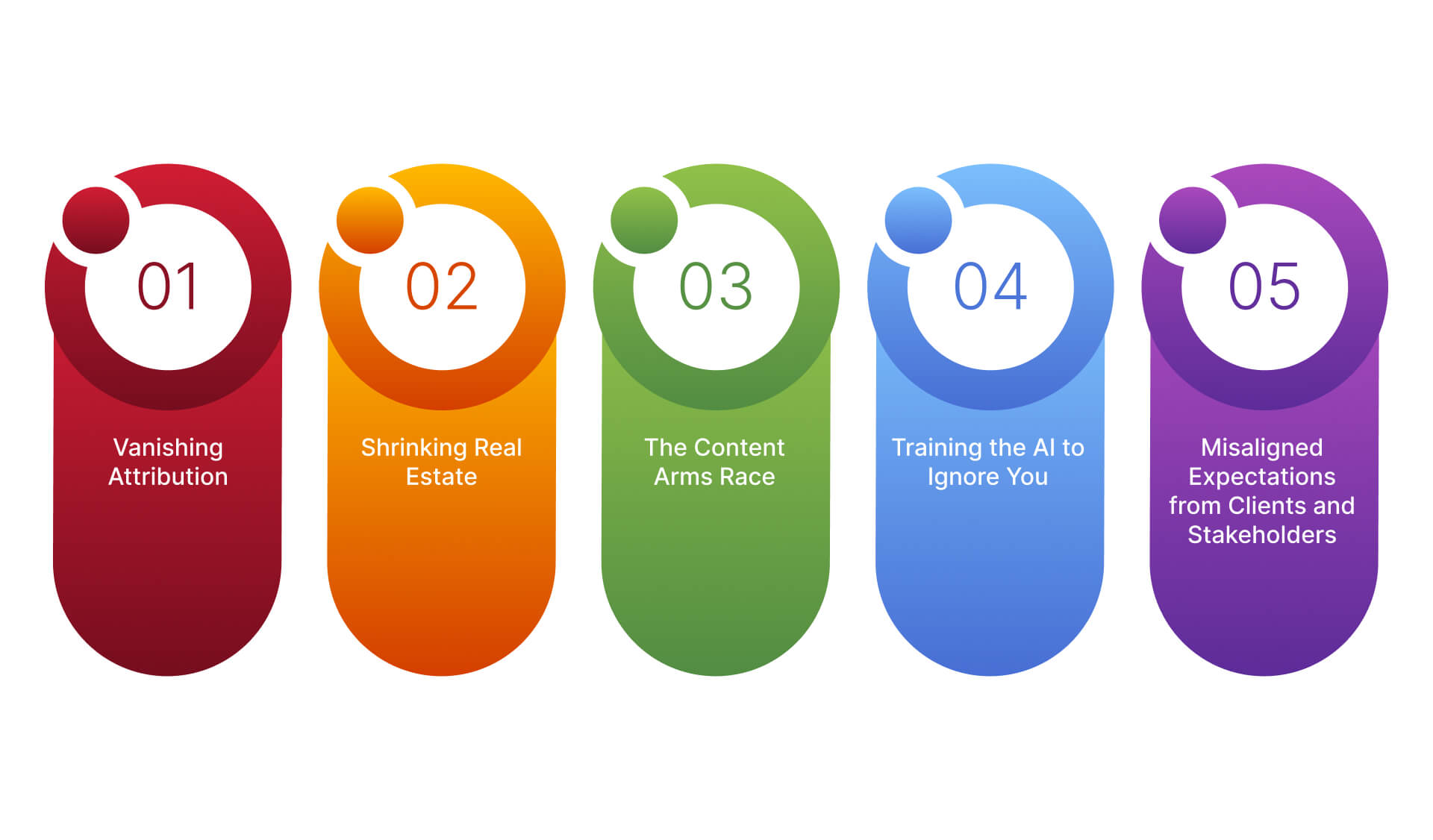
Of course, not all that glitters is traffic. With new opportunities come hard, often uncomfortable challenges — and the shift to AI search is no exception.
The impact of SearchGPT on SEO is forcing even seasoned professionals to question long-held assumptions. Here’s what’s making their jobs harder — and how to prepare.
1. Vanishing Attribution
This is the big one. When SearchGPT answers a question directly, users often don’t click through to the source. Unlike Google, which still shows URLs, the AI interface abstracts that information away.
This makes it harder to measure traffic, assign ROI, or even prove your content had an effect — a massive problem for teams used to proving their value via analytics dashboards.
Until attribution standards evolve, searchGPT SEO becomes more about influence than measurable clicks — and that’s a hard sell to stakeholders expecting traffic reports.
2. Shrinking Real Estate
Even if your content ranks in traditional search, the new AI layouts — summaries, suggestions, AI-generated answers — mean less space for organic links. The visual dominance of generated content is a direct competitor to even the most optimized pages.
And while that sounds like a design issue, it’s a visibility crisis. For some queries, the AI is the front page. And unless you’re inside that synthesis, you’re on the outside looking in.
This is where best searchGPT SEO services shift focus: from rank to relevance, from page one to response one.
3. The Content Arms Race
AI creates content at scale. Fast. Cheap. This flood has created an oversaturated internet, and distinguishing yourself amidst the noise is harder than ever. Add to that the fact that generative models often paraphrase existing content, and you risk becoming raw material for someone else’s visibility.
So what’s the move?
Depth. Originality. Voice. Context. Human experience.
SEO for SearchGPT isn’t about producing more — it’s about producing better. Something the model can’t fabricate on its own.
4. Training the AI to Ignore You
Here’s a tough pill: if your content isn’t distinct, useful, and structured — you’re training the AI to skip you. Every time you publish another vague, derivative blog post, you make yourself irrelevant in the training corpus.
SearchGPT doesn’t hate you. But it learns who to trust. And right now, most websites are teaching it to ignore them.
5. Misaligned Expectations from Clients and Stakeholders
This is perhaps the most human challenge. SEO has always been misunderstood by clients — and now, the landscape is changing so rapidly, most business owners are lost in translation. They still want rankings, clicks, conversions. Meanwhile, the KPIs are shifting underfoot.
Agencies offering top searchGPT SEO services now need to double as educators — helping clients understand not just what they’re doing, but why the definition of “winning” has changed.
What This Means for the Future of SEO
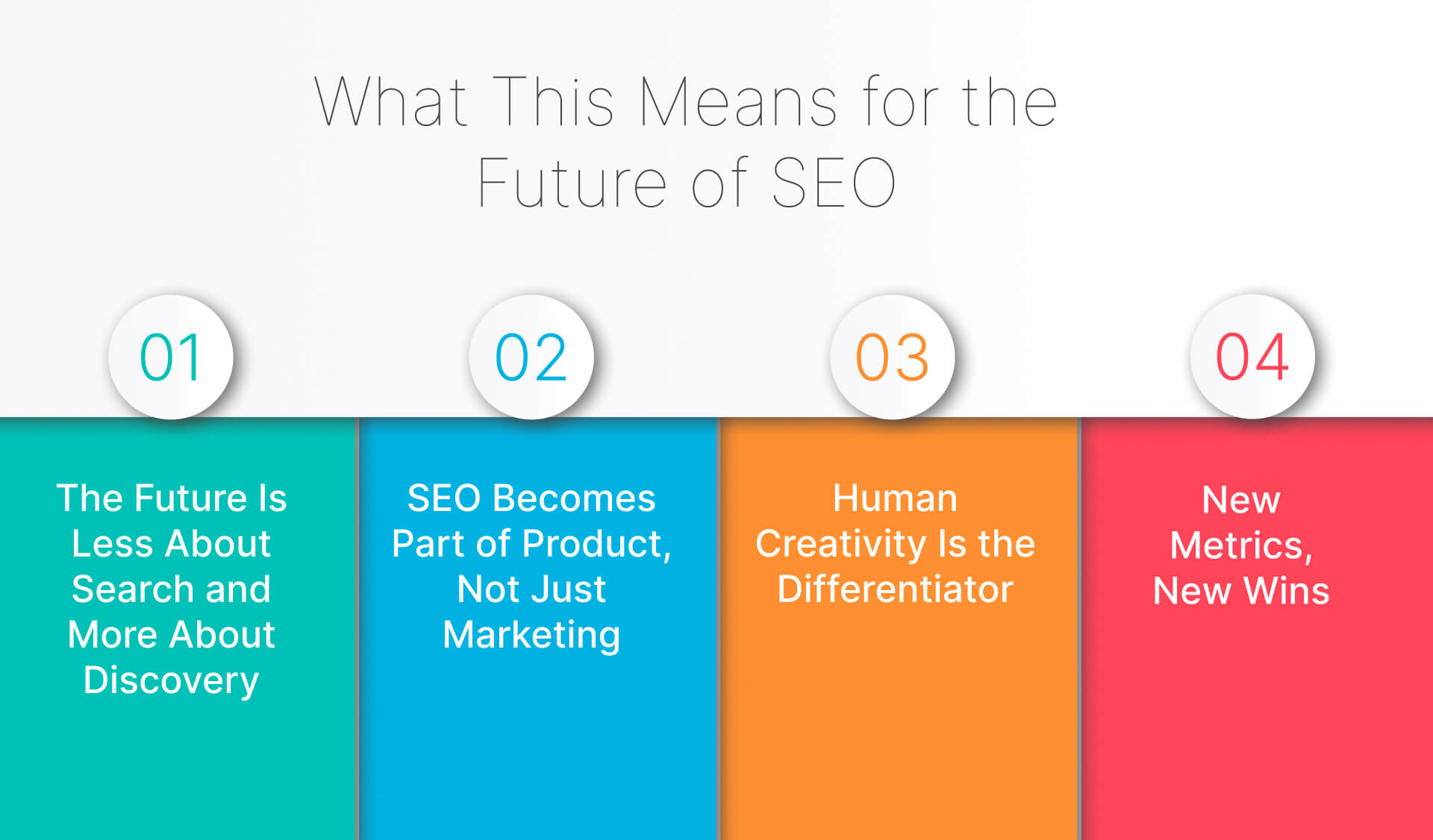
Let’s not sugarcoat it — SEO is changing more right now than it has in a decade. And it’s not just about new tools or tactics. It’s about redefining what it means to be visible in a world mediated by AI.
The impact of SearchGPT on SEO is irreversible. But that doesn’t make it insurmountable. It just requires a new mindset.
The Future Is Less About Search and More About Discovery
As AI search becomes more anticipatory — predicting questions, inferring needs, delivering context-rich answers — the future of SEO is less about keyword matching and more about intent alignment. You won’t just be optimizing for queries. You’ll be optimizing for curiosity.
And this changes everything from content design to topic ideation to on-page UX.
SEO Becomes Part of Product, Not Just Marketing
In the AI search era, your content isn’t just an ad for your offering — it is the offering. Whether it’s helping, educating, or explaining, your content is how users discover and assess your expertise. This pushes SEO closer to product development. It must reflect brand values, user goals, and editorial integrity — all at once.
Human Creativity Is the Differentiator
Let the machines generate summaries. Humans must deliver insights.
AI is fast, but it’s not you. The brands that inject real experience, storytelling, originality, and even vulnerability into their content will rise above the algorithmic blur. The future belongs to those who aren’t just optimized, but memorable.
This is the era for the bold — and the strategic. Best SearchGPT SEO services are now less about technical tweaks and more about content strategy, brand experience, and editorial courage.
New Metrics, New Wins
Traffic may decline. Clicks may flatten. But if your content starts showing up in synthesized responses, brand mentions, citations, and voice search results — you’re winning. Even if Google Analytics can’t quite quantify it yet.
The leaders in searchGPT SEO will find ways to measure influence, not just visits. To map reach, not just rankings. And to prioritize visibility where it matters — inside the answers people trust most.
Confused About SEO for SearchGPT Algorithms?
Traditional tactics no longer work. Learn how SEO for SearchGPT focuses on authority, structure, and AI-ready content. Fill out the form for expert guidance, no fluff.
Talk to an SEO Specialist
Conclusion: Adapting to the New Search Paradigm
Every once in a while, the ground beneath digital marketing shifts so profoundly that the old playbooks don’t just become outdated — they become liabilities.
SearchGPT is not a trend. It’s not a plugin. It is the beginning of a new cognitive layer in how the world discovers, learns, and decides.
For those of us who’ve watched search evolve over two decades — from meta tag games to mobile-first indexing, from link farms to BERT — this feels different. Not because it threatens the industry, but because it challenges our assumptions about what search is.
Search is no longer a list of results. It’s a dialogue. A synthesis. A reflection of intelligence that isn’t just indexed — it’s interpreted.
The impact of SearchGPT on SEO is not about a loss of traffic. It’s about a loss of passivity. The era where publishing “something” was enough is over. The era ahead belongs to those who create content that shapes models, not just rankings.
That requires strategy. But it also requires courage — the courage to be original, to lead with clarity, to teach machines how your brand thinks. To turn data into insight, voice into authority, and content into a living asset, not just a marketing checkbox.
The future will reward those who adapt — not by shouting louder, but by becoming more relevant, more trusted, and more indispensable inside the new architecture of discovery.
And make no mistake — adaptation is not optional. It’s the cost of visibility in a world no longer ruled by links, but by logic.
Brands that recognize this early will write the rules. The rest will read summaries written by others.
If your team isn’t evolving its strategy to account for this shift, it’s time. And if you’re navigating this terrain without the right partner — a team that understands the mechanics of AI, the nuance of human language, and the psychology of search — you’re flying blind in a storm.
That’s where the right organic SEO agency steps in — not to sell shortcuts, but to build substance. To create ecosystems of content that aren’t just visible today, but foundational tomorrow.
This is not a pivot. It’s a paradigm.
You can either become part of the answer — or disappear in someone else’s.
The choice, as always, is yours.
FAQs
ChatGPT Search pulls real-time data from across the web and responds in natural, conversational language. Instead of showing a list of links, it generates direct answers, backed by context and clarity. The engine continuously refines its outputs based on quality, recency, and user relevance.
Google’s AI Overviews summarize existing web content directly in the search interface, while ChatGPT Search generates answers conversationally, often without needing to click through. Both aim to save time, but their structure and user intent handling are fundamentally different. One curates; the other composes.
AI-driven search engines demand clearer, better-organized, and intent-focused content. The days of optimizing solely for keywords are behind us — now it’s about writing for the machine’s understanding. SEO strategy must include structured data, topical authority, and conversational tone to be AI-ready.
Yes, especially for simple queries. Users often find answers without visiting any site. But for businesses creating depth-rich, valuable content, AI inclusion can drive higher-quality exposure. Visibility is no longer measured in clicks alone — it’s measured in influence and integration.
Absolutely. It’s no longer enough to rank — now, content must be designed to appear in answers generated by AI. This requires formatting, structure, and intent-matching that go beyond traditional SEO. AEO and GEO are strategic evolutions, not optional upgrades.
Not entirely. While AI excels at summarizing straightforward queries, it still struggles with nuance, ambiguity, and layered intent. Traditional search remains essential for discovery, comparison, and deeper research. The future is hybrid — where both systems coexist to serve different needs.




